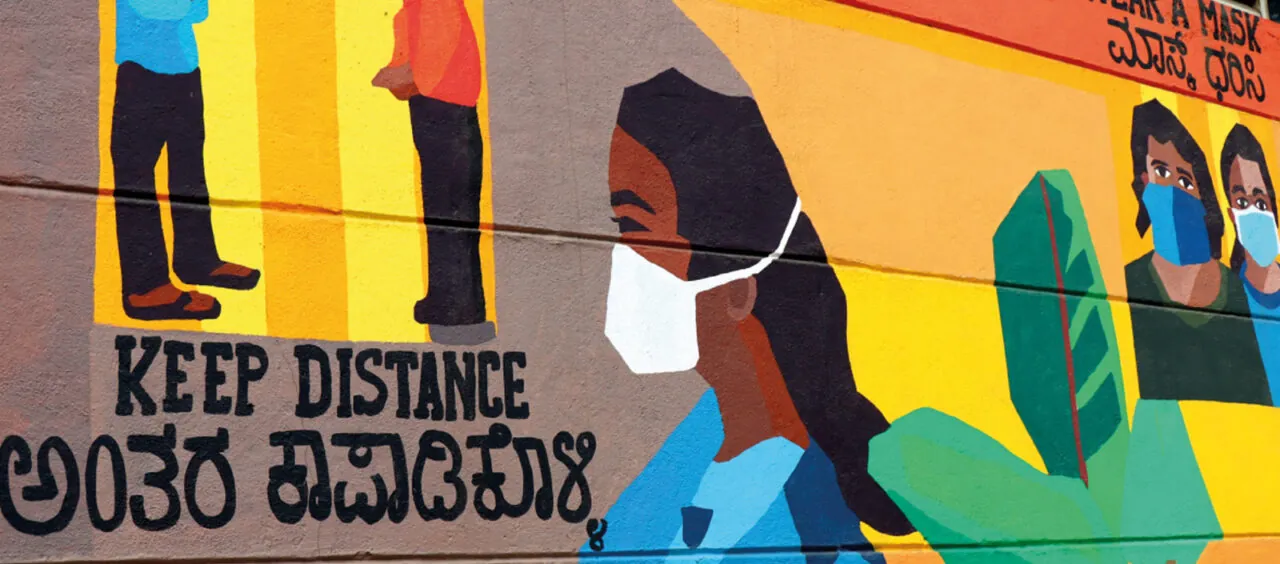The world is facing the prospect of more frequent complex, uncertain, and harmful compound shocks, that are happening simultaneously or in rapid succession. Currently we are facing multiple, overlapping challenges with the war in Ukraine exacerbating a global cost-of-living crisis, coupled with the lingering effects of Covid-19 and ongoing climate change impacts. Vulnerability shapes people’s ability to respond to challenges; those that are most marginalised and therefore least able to cope will likely be hit the hardest by compound crises, as was seen in the Covid-19 pandemic.
The majority of the underlying and interconnected environmental, economic, and social challenges that exist in the globalised world pre-date Covid-19. But the difficulty of managing multiple crises is gaining further attention with the experience of the Covid-19 pandemic, whose “creeping” character caused additional challenges that made its’ management much harder to handle. The most recent Covid Collective helpdesk report explores some emerging learnings from managing the Covid-19 pandemic, especially where the pandemic overlapped with other crises, as well as insights from the wider disaster risk and crisis management literature that may be relevant for navigating multiple, compounding challenges now and in the future. These insights are largely interconnected and intertwined with one another.
Managing Multiple Crises: Lessons from Covid-19
Countries will need to build (further) resilience to adapt to and recover from compounding shocks, especially in developing and fragile states. This call for resilience is not new but is now more pertinent than ever before. Vulnerable people and marginalised groups will need to be put front and centre in responses. Social cohesion and trust are key to building resilient communities, and the global infrastructure will need to be better able to deal with an increasingly uncertain and “unruly” world.
Short-term, single-hazard disaster management is still dominant
The Covid-19 pandemic revealed shortcomings in the dominant single-hazard disaster management approaches and crisis response, which are often short-term in nature. Despite previous lessons learned, governments still tend to think of hazards as one-off events with clear start and end dates, and providing an often narrow, technocratic response. Systemic risks require systemic responses to build resilience – a forward-thinking, long-term approach to dealing with multiple and evolving drivers and effects of crises unfolding on different timescales and with different magnitudes is needed.
Putting vulnerable and marginalised groups front and centre in recovery efforts
The scale of the current intersecting crises needs a more ambitious transformative pathway to zero poverty, which calls for centring “social justice, peace and the planet” and a focus on recovery. Countries need to address ethical and social justice considerations and the politics of recovery efforts by putting vulnerable and marginalised groups front and centre in the aftermath of pandemics and natural disasters. But efforts need to recognise and expect that not everyone recovers in the same way and that some may become more marginalised through the recovery process. Power and politics also shape recovery agendas and measures, and can lead to poorly designed and targeted interventions.
Conflict-sensitivity is also vital in responses to crises. Efforts need to be tailored to individual contexts, with a strong understanding of local dynamics and power structures, the root causes of conflict and fragility and sources of resilience, the dynamic interplay between these drivers, and who is most marginalised and vulnerable. Understanding the broader political economies and political ecologies of overlapping crises is also vital. This also relates to having robust data and analysis infrastructure, which is a lesson highlighted throughout the Covid-19 literature.
Resilience building is more important than ever
Much of the literature discusses the concept of resilience. Resilience is a loosely defined term, which means different things to different people, but largely relates to a community’s ability to endure shocks and stresses. It also relates to addressing systemic vulnerabilities and injustices – many of which were brought to the fore during the pandemic. A key lesson underscored in the literature is the need for urgent action on increasing resilience at various levels but that strengthening of underlying systems takes a long-time. Hence, communities and bottom-up approaches to resilience need long-term investment to be able to respond to crises.
Social cohesion is a primary resource for communities to draw upon during a crisis, social capital (including the bonds within communities, the bridges across communities, and the links between communities and formal institutions) plays a core role in building resilience. As discussed in a previous Covid Collective helpdesk, local and community-based responses were critical in the early stages of the Covid-19 pandemic response across the World, as community organisations and networks were able to pivot and adapt quickly to the pandemic, identify local needs and reach those most in need. These often mirrored or built on past responses to crises and climate impacts and will likely be important to withstanding future risks and achieving long term resilience and recovery. These communities are also important in establishing and rebuilding trust and cohesion after a crisis. To strengthen and leverage social cohesion and community resilience during a crisis, there is a need for investment in these resources beforehand during prosperous times, as well as during and after disasters, but this needs to be done with an equity lens to ensure no one is left out.
The pandemic response highlighted the increasingly important role of social protection in response to intersecting shocks, although questions remain around the effectiveness of different policy approaches and how best to integrate responses across agencies and institutions. Specifically, the pre-existence of social protection systems had a strong relationship to the speed of programme expansion during Covid-19 in 2020. This demonstrates the importance of having social protection systems that are in place and institutionalised before shocks occur. However, there was a widespread inability for social protection systems to meet coverage and demand across various countries, especially when providing for vulnerable groups and informal sector workers – highlighting the importance of having flexible systems.
Governance-related characteristics and capabilities that affect a country’s resilience have also been reviewed, with three governance “super-factors” coming to the fore. These are: high levels of societal trust (so that mitigation measures or responses to a crisis are accepted); low corruption levels (as corruption can erode both a government’s will and ability to act); and high-quality political leadership (this underlies both of the previous factors, political leaders at all levels have an outsized influence on whether a period of crisis will bring unity or division). The issue of trust was also flagged in other studies, especially as a key part of state-citizen alliances which is important in times of crisis. Countries where there were pre-existing high levels of mistrust in authorities (such as in Chile, Haiti, and Zimbabwe) meant that top-down responses during the Covid-19 pandemic were met with suspicion and resulted in a lack of legitimacy for the government’s actions. Low or a lack of institutional trust also has implications for the adoption of interventions and recovery programmes after a crisis.
Robust risk-informed decision-making under uncertainty is critical
Although many have had a crisis of confidence in the effectiveness of multilateralism and multilateral development banks, others see them, with the right reforms and the right financial capacity, as being key to dealing with these overlapping crises and shared global challenges. Others argue the need for a rethink of development and the international architecture, with Covid-19 exposing the vulnerability of the current globalised capitalist economy and reminding us that the world faces an uncertain future. One thing is clear, now more than ever there is a need for development approaches and a global infrastructure that can anticipate and deal with uncertainty. Covid-19 forced governments to respond when there was an absence of evidence. Complex crises (such as the pandemic) call for analysis that looks at both “structural political-economic conditions alongside far less ordered, ‘unruly’ processes” considering complexity, uncertainty, likelihood, and context-specificity. Flexibility will be key for future systems to be able to respond to diverse types of disasters. Policy processes will need to adopt an “active learning mindset” to make decisions under deep uncertainty (clear and decisive, but also flexible and modular to incorporate rapid learning), enable greater collaboration between governance levels and across agencies, and set up a robust data infrastructure. In the pandemic, coordinated efforts across sectors within governments were important in successful responses. To improve responsiveness and resilience to future crises, there is a need to build multi-level governance structures based on empowering participation, engagement and cooperation to understand local and vulnerable groups’ changing needs.



